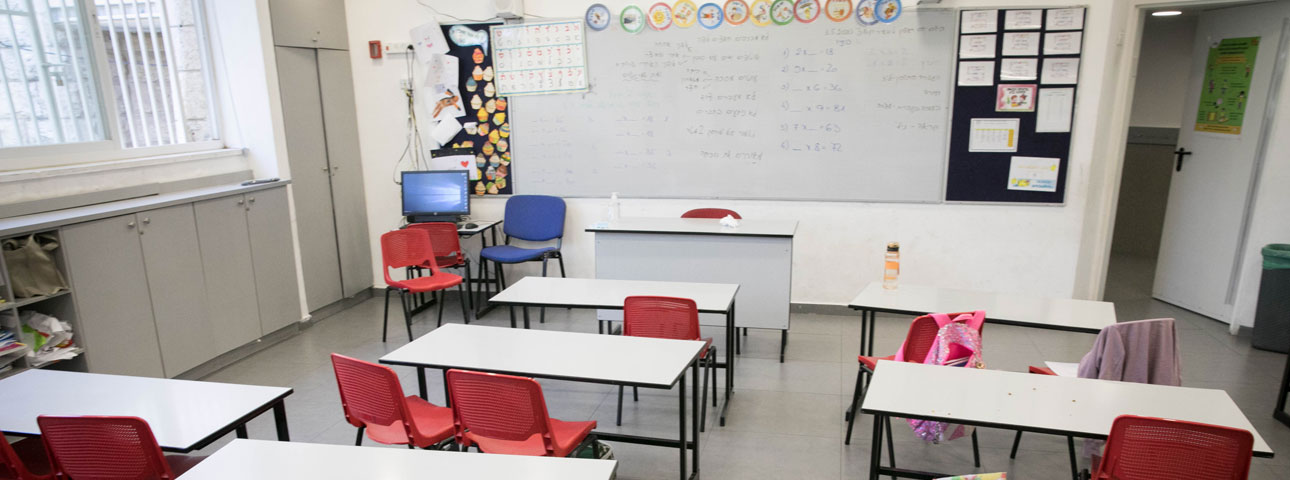Why Don't We Talk to the Teachers?
The pandemic offers a chance for much-needed educational reform, but the hasty return is raising fears that the opportunities presented by the crisis for truly driving the education system forward into the 21st century are being missed

Flash 90
It has been over a year now since the outbreak of COVID-19, and the Israeli education system has almost completely reopened. As if the pandemic had never happened, the system has gone back to operating fully just as it did before, face-to-face in the classroom, with no separation into 'pods'. This hasty return is raising fears that the opportunities presented by the crisis for truly driving the education system forward into the 21st century are being missed. Again.
From discussions being held at the Ministry of Education about the future of the education system, and from the way we can see that schools are being reopened in our communities, it would appear that lessons are once again not being learned, and that the views of education professionals with the most hands-on experience are once again not being taken into account. This raises the question: Why are school principals and teachers not being consulted? And why are local authorities not being given the autonomy with which they could create appropriate responses to the needs of the educational community for which they are responsible? In most cases, the simple and painful answer is one which is not paid sufficient attention: Trust.
Despite declarations of support for education workers, it seems that the Ministry does not really trust them. The fact that real innovations have been introduced into the structure and routine of learning in many schools over the last year, should not food anyone. These outbursts of creativity originated 'bottom-up' from the field, despite the contradictory and confusing instructions issued by the Ministry and despite its efforts to micromanage every action taken during such a chaotic and complicated time. And yet, educators in the field are now not being given a place at the table to help guide the transition out of crisis and partner in the formulation of a vision for the future.
If there is one thing that the pandemic exposed, it is that the traditional centralized approach of the Ministry of Education simply does not work. In fact, it is actually damaging, as in a certain sense it undermines the declared aims of the State Education Law, which was last amended in 2000 and which is supposed to serve as a roadmap for the entire education system. For example, one of the aims set out by the law relates to developing “children’s personalities, their creativity, and their various talents; fully realizing their abilities as human beings leading a life of quality and meaning.” Another aim is “to afford equal opportunities to every child, to enable them to develop each in their own way, and to create an atmosphere that encourages difference and supports it.”
Over the last year, the individual needs of students, particularly those in grades 5–10, were not properly met, whether emotional, social, or academic, and the principle of equal opportunity was certainly not upheld. The fact that the education system has so quickly abandoned the use of pods, for example, which offered the possibility of reducing the number of students in class, shows how much this return to normal is failing to capitalize on the opportunities presented by this crisis.
Conversations with educational professionals and focus groups among teachers have revealed a strong sense that the Ministry of Education has no faith in them—neither in those who teach in nurseries and schools, nor in the professionals working in local education departments. The Ministry of Education does not trust education workers to use their own professional, pedagogical, and human judgement based on their familiarity with their students. There is no consultation with educational staffs, school principals, or teachers.
Opening the education system in its entirety as if nothing had happened shows that the Ministry is looking to go back in time to preserve existing structures, instead of seeking ways to moving forward and attempting to improve our educational systems. They claim that they are seriously considering steps that could lead to a shift away from the centralized control of the Ministry of Education toward greater distribution of educational authority: increasing the pedagogical autonomy of school principals, and conferring broad powers and responsibilities on local education departments. But without the involvement of educators in schools these proposals will not bring real change we all need. Continuing the political bartering that has characterized the management of the COVID crisis will severely damage the education system and the status of teachers among parents and the general public, which is already at a nadir.
There are practical steps that can make a difference. In the short term, educational staffs should be included in consultations and discussions, the needs they identify in the field should be recognized, and their suggestions should be listened to. In the long term, steps should be taken to begin rebuilding the trust of the education system in its own dedicated people, while at the same time seeking to restore its standing with the parents of the student body. Failing to do this, and racing to return the system back to where it was before the pandemic, without properly pausing to take stock and plan a new path forward, will be a cause for regret for years to come.
The article was published in the Times of Israel.
